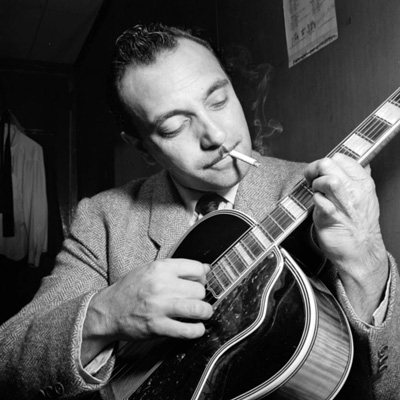Jean “Django” Reinhardt, 23 January 1910 – 16 Mai 1953 was a Belgian Gypsy Jazz guitarist. Jean Reinhardt was born in Liberchies (Belgium) as Jean Reinhardt. Reinhardt’s Gypsy nickname, “Django”, was Romani for “I am awake”. His youth was spent in Parisian gypsy encampments, where he learned to play the banjo, guitar, and violin. He also worked at Paris’ Bal-musette halls. His first instrument was the violin. He then moved to the banjo-guitar which had been gifted to him. In 1928, his first recorded recordings were of Reinhardt playing the banjo. Reinhardt, then eighteen years old, was burned in a fire that destroyed the caravan he lived with Florine “Bella”, his first wife. Bella created imitation flowers from celluloid and papers to supplement their income. Their home was filled with this highly flammable material because they were extremely poor. Django, who was returning from a late night performance, apparently knocked over the candle as he went to bed. His family and neighbours were quick to rescue him, but he sustained first- and second-degree burns to half of his body. His right leg was paralysed, and his third and fourth fingers on his left hand were severely burned. His doctors believed he would never be able to play the guitar again so they decided to amputate one leg. Reinhardt refused the surgery and was discharged from the hospital within a few days. He was able walk in a year using a cane. Django was gifted a guitar by his brother Joseph Reinhardt. Joseph Reinhardt is an accomplished guitarist. Django learned his craft through painful rehabilitation and practice, even though his third and fourth fingers were partially paralysed. He was able to play all his solos on guitar with just two fingers and used the injured digits for chord work. Reinhardt formed the Quintette du Hot Club de France in 1934 with Stephane Grappelli, a Parisian violinist, and Reinhardt’s brother Joseph on guitar and Roger Chaput, on bass. Reinhardt’s friend and Gypsy fellow Gypsy Pierre “Baro” Ferret sometimes replaced Chaput. Freddy Taylor, the vocalist, participated in some songs such as “Georgia On My Mind” and “Nagasaki”. Jean Sablon, a French singer, was the first to record more than 30 songs with him since 1933. Their guitars were also used for percussive sounds as they did not have a percussion section. One of the most well-known jazz groups was the Quintette du Hot Club de France, which consisted only of string instruments. Reinhardt wrote many original, influential tunes like “Daphne”, “Nuages”, and “Manoir De Mes Reves”, along with mad swingers like “Minor swing” or the ode of his 1930s record label, “Stomping At Decca”. One story claims that Reinhardt was exposed to American jazz during his recovery period when he discovered a 78rpm copy of Louis Armstrong’s “Dallas Blues”, at an Orleans flea marketplace. After his recovery, Reinhardt resumed playing in Parisian cafés until Pierre Nourry, Hot Club chief, suggested the idea to Reinhardt u0026 Grappelli of an all-string group. The Quintette du Club de France was thus born. It quickly became a global hit thanks to an extensive series of Ultraphone, Decca and HMV recordings. Reinhardt recorded two takes of “Parce que je vous aime”, and “Si, j’aime Suzy” in Paris on March 13, 1933. He used three guitarists, an accordion, a violin, and a bass to provide great guitar support. The recordings of August 1933 were made using more than one instrument (Joseph Reinhardt and Roger Chaput), as well as the first recording by Quintet. It is important to note that both years featured many horns, sometimes in multiples, and a variety of pianos. Reinhardt recorded and played with many American Jazz icons, including Benny Carter and Coleman Hawkins. He also recorded with Rex Stewart, who later stayed in Paris. Reinhardt also performed a jam session and radio performance alongside Louis Armstrong. He also gigged in France with Dizzy Gillespie later in his career. Reinhardt couldn’t read or write music and was not literate. Grappelli taught Reinhardt during the band’s downtime. The Quintette was disbanded by the outbreak of World War II in 1939. Grappelli remained in London, where the group was performing, and Reinhardt returned to France. He led a large band with Hubert Rostaing as clarinettist, while Grappelli remained in London. Reinhardt returned to France after the liberation. Reinhardt began to play the electric guitar in 1946 and traveled the United States as a soloist with The Duke Ellington Band. However, his performances were not well received. His recordings of electric guitar are bop escapades. His playing sounds more frantic than the joyous swing of old. Reinhardt and Grappelli had sporadic reunions in January 1946. Here, the bop influences were more subtlely integrated into the swing’s old format. Reinhardt became less active in the 1950s and remained in Europe until his stroke in Fontainebleau (France) on 16 May 1953. Text contributed by users is available under Creative Commons By–SA License. It may also be available under GNU FDL.
